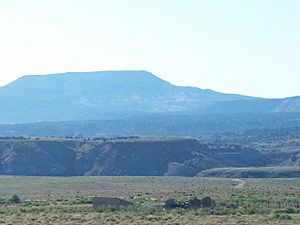Victor, Utah facts for kids
Quick facts for kids
Victor, Utah
Desert Lake
|
|
|---|---|

Victor, as seen from a dirt road near Elmo, August 2010
|
|
| Country | United States |
| State | Utah |
| County | Emery |
| Founded | 1910 |
| Abandoned | 1920 |
| Named for | George W. Victor |
| Elevation | 5,525 ft (1,684 m) |
| GNIS feature ID | 1437712 |
Victor (also called Desert Lake) is a fascinating ghost town located in Castle Valley, in the northern part of Emery County, Utah, United States. A ghost town is a place where people once lived and worked, but then everyone moved away, leaving buildings and traces behind. Victor was a small community that existed for only about ten years.
Contents
The Story of Victor, Utah
Victor was settled in 1910. It was named after George W. Victor, who worked for the postal service. The town was home to people who were mostly farmers.
Why People Moved to Victor
Before Victor was founded, many people lived in a nearby town called Desert Lake. In 1910, a dam broke near Desert Lake. This caused the soil to become very salty, making it impossible to grow crops. Because farming was their main way of life, the residents of Desert Lake had to find a new place to live. They chose a spot about 6 miles (10 km) east of Elmo. This new location became the town of Victor.
Life in Victor
Once they moved, the settlers built homes and even a schoolhouse. However, farming in Victor was much harder than it had been in Desert Lake. The area around Victor was very dry. There were also many sand dunes nearby. Strong winds would often blow sand from these dunes onto the farms and buildings. This made it difficult for crops to grow and for people to live comfortably.
Why Victor Became a Ghost Town
The biggest challenge for Victor was the lack of rain. The area simply did not get enough water to support farming. By 1920, after ten years of struggling with dry conditions and blowing sand, the people of Victor decided to leave. They packed up their belongings and moved away, seeking better land elsewhere. Today, only the old schoolhouse and a few building foundations remain at the site of Victor. These ruins are a quiet reminder of the community that once tried to make a home in the dry Utah landscape.
 | Lonnie Johnson |
 | Granville Woods |
 | Lewis Howard Latimer |
 | James West |



